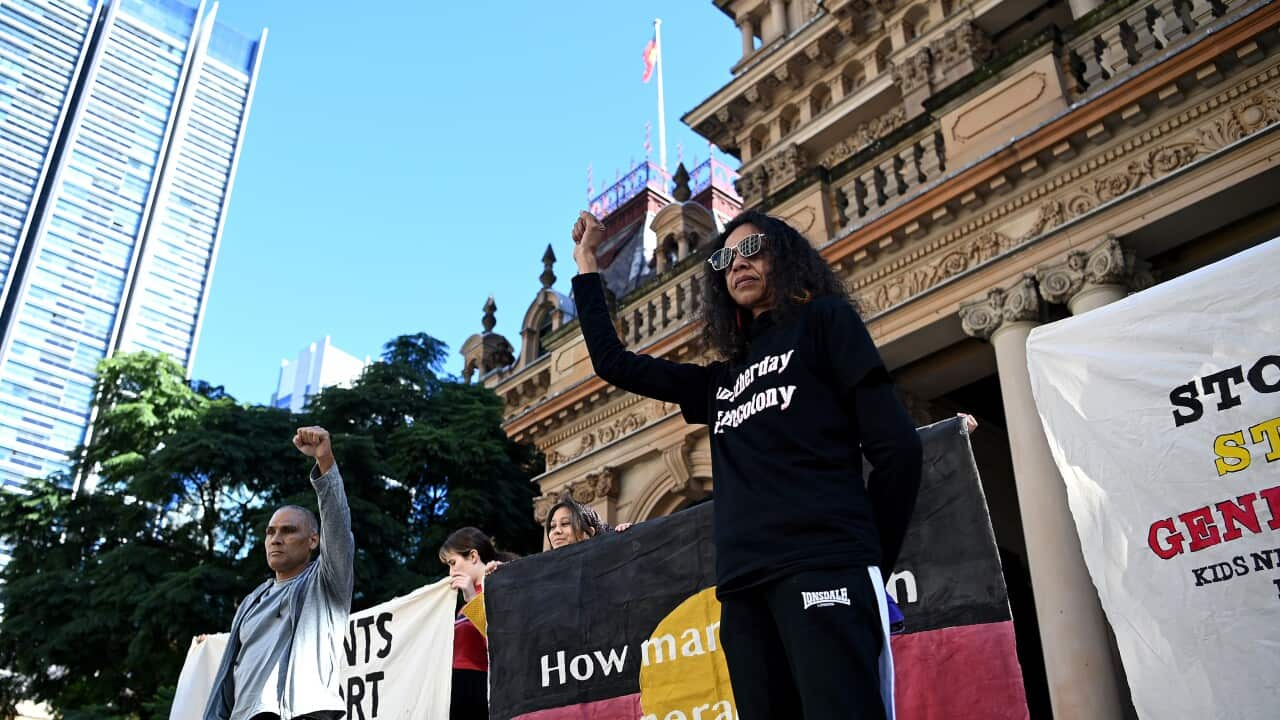WARNING: this article discusses themes that may be distressing to some readers.
I'm a Gomeroi woman, and I grew up with the best teachers.
We will always stand strong, and say what we've always been saying: land rights.
I grew up in Moree in the 70s. We lived in a tin humpy by the riverbank, until we were moved. My dad built another humpy, but we were moved again, ending up in Stanley Village.
Cotton chipping was our main source of income. We didn’t grow up rich, but it’s not that there wasn’t money going around. In the 1980s it was one of the richest rural industries in the world.
And yet few of us had cars. Many still don’t.
It’s not the only thing that hasn’t changed. My grandparents met in Moree, having been moved there. Relatives of my grandfather’s were moved to missions and reserves in Cherbourg and Woorabinda. I’ve still got family there too.

Gwenda Stanley has turned up to fight for the rights of her people for decades. Credit: Supplied: Gwenda Stanley
It’s why I get angry when we are told to ‘get over’ colonisation. This isn’t something that happened two hundred years ago: it’s happening today.
We're still being incarcerated; we're still being ostracised; we're still being oppressed by government officials. We are the survivors of the ones they couldn’t kill.
It’s also why I’m angry about the conversation going on right now in this country about a Voice to Parliament. All I see from this Voice is that we are going to have the same people having control over our welfare, just another mission manager-style of organisation to control us.
Where has that gotten us? What do we have? I've lost a lot of people over the decades, and in that time there's been no change. The Old People used to say, 'We're never going to see it'.
So the dialogue around the Voice frustrates me because it distracts from the biggest issues we face: sovereignty, land rights, and addressing the genocide of our people.
Fighting for our land, the most important thing of all
When you grow up in a place like Moree, you get out there, you put on the red, black and yellow and march in the streets.
In the 70s and 80s, I was out there with my family marching, but by the 90s you could see the complacency setting in.
By the 2000s it was becoming a game, and that's where my kids have stepped on to the frontline. Over the last 20 years they've protested, but also educated people that this isn't a game.
That's been my journey, but I never asked for any of this. I've never claimed to be anyone's leader, nor do I now.
I was one of the delegates to the Uluru Dialogues that was called 'a radical'.
But our mandate coming away from that meeting was that it was a flawed process.
On our terms
This country likes to talk about change, and there needs to be one. Sovereignty is about self-determination, on our own terms, not about having bodies that overlook and control everyone's affairs.
We've had the Bringing them Home report, the Deaths in Custody report, reports into frontier massacres and closing the gap.
These are documents of the genocide in this country, but what happens?
The proposed wording of the Voice does not even distinguish between the many sovereign nations that make up this continent. We are not one Aboriginal people in this country.
We need to start seeing land rights on our terms. We need to change structures so that Aboriginal people can benefit without being forced into something that we don't really want.
Will it give us our land back, or just a couple of national parks that no one's allowed to live on? Will land councils continue to evict people, as they did my family? Will pensioners continue to pay exorbitant rent?
Everyone else has become rich from this country, ripping minerals and resources from the ground. All we're asking for is a bit of our land back.
Let's start talking about equity and equality because the colonialists are still benefiting from their arrival to this continent in 1788.
We must be talking about Aboriginal Sovereignty.
Until Australia is taking action, accountability and responsibility for the genocide, let's talk restitution and reparatory justice.
Gwenda Stanley is a Gomeroi Rights Activist and advocate. She is a spokesperson for the Aboriginal Tent Embassy and also an educator and dancer.


